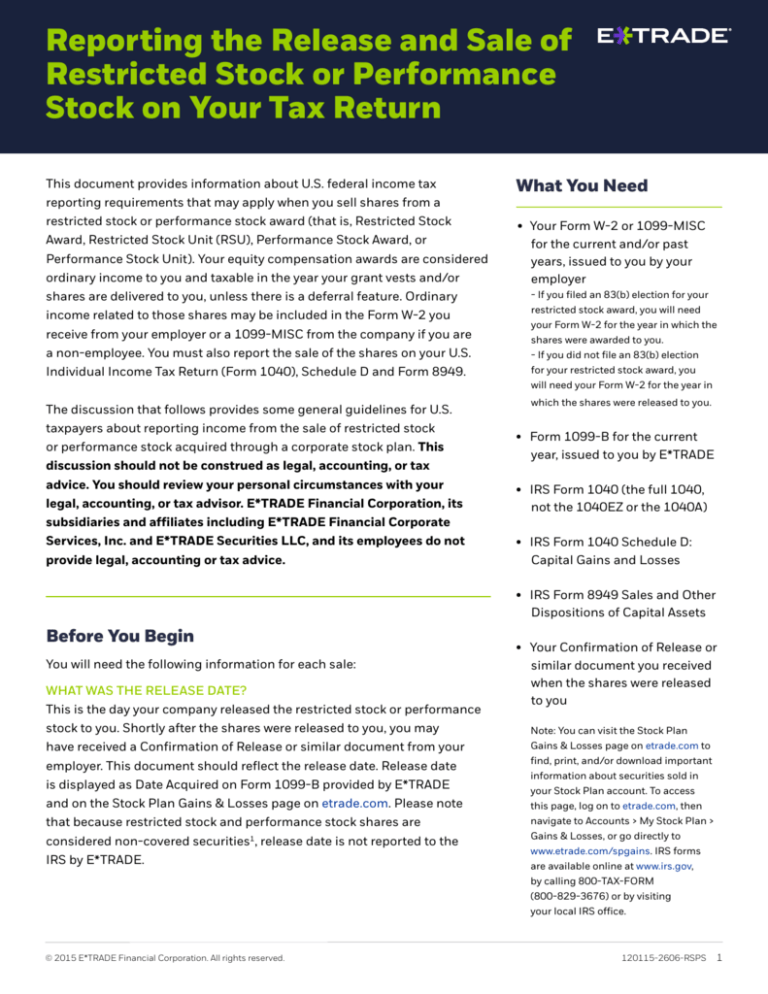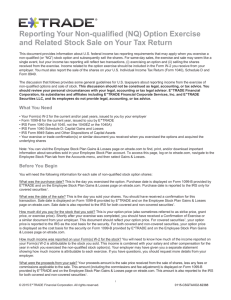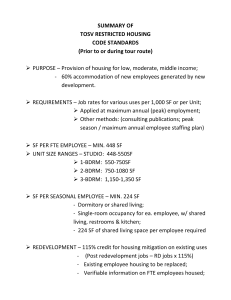
Reporting the Release and Sale of
Restricted Stock or Performance
Stock on Your Tax Return
This document provides information about U.S. federal income tax
reporting requirements that may apply when you sell shares from a
restricted stock or performance stock award (that is, Restricted Stock
Award, Restricted Stock Unit (RSU), Performance Stock Award, or
Performance Stock Unit). Your equity compensation awards are considered
ordinary income to you and taxable in the year your grant vests and/or
shares are delivered to you, unless there is a deferral feature. Ordinary
income related to those shares may be included in the Form W-2 you
receive from your employer or a 1099-MISC from the company if you are
a non-employee. You must also report the sale of the shares on your U.S.
Individual Income Tax Return (Form 1040), Schedule D and Form 8949.
The discussion that follows provides some general guidelines for U.S.
taxpayers about reporting income from the sale of restricted stock
or performance stock acquired through a corporate stock plan. This
discussion should not be construed as legal, accounting, or tax
advice. You should review your personal circumstances with your
legal, accounting, or tax advisor. E*TRADE Financial Corporation, its
subsidiaries and affiliates including E*TRADE Financial Corporate
Services, Inc. and E*TRADE Securities LLC, and its employees do not
provide legal, accounting or tax advice.
What You Need
• Your Form W-2 or 1099-MISC
for the current and/or past
years, issued to you by your
employer
- If you filed an 83(b) election for your
restricted stock award, you will need
your Form W-2 for the year in which the
shares were awarded to you.
- If you did not file an 83(b) election
for your restricted stock award, you
will need your Form W-2 for the year in
which the shares were released to you.
• Form 1099-B for the current
year, issued to you by E*TRADE
• IRS Form 1040 (the full 1040,
not the 1040EZ or the 1040A)
• IRS Form 1040 Schedule D:
Capital Gains and Losses
• IRS Form 8949 Sales and Other
Dispositions of Capital Assets
Before You Begin
You will need the following information for each sale:
WHAT WAS THE RELEASE DATE?
This is the day your company released the restricted stock or performance
stock to you. Shortly after the shares were released to you, you may
have received a Confirmation of Release or similar document from your
employer. This document should reflect the release date. Release date
is displayed as Date Acquired on Form 1099-B provided by E*TRADE
and on the Stock Plan Gains & Losses page on etrade.com. Please note
that because restricted stock and performance stock shares are
considered non-covered securities1, release date is not reported to the
IRS by E*TRADE.
© 2015 E*TRADE Financial Corporation. All rights reserved.
• Your Confirmation of Release or
similar document you received
when the shares were released
to you
Note: You can visit the Stock Plan
Gains & Losses page on etrade.com to
find, print, and/or download important
information about securities sold in
your Stock Plan account. To access
this page, log on to etrade.com, then
navigate to Accounts > My Stock Plan >
Gains & Losses, or go directly to
www.etrade.com/spgains. IRS forms
are available online at www.irs.gov,
by calling 800-TAX-FORM
(800-829-3676) or by visiting
your local IRS office.
120115-2606-RSPS
1
Reporting the Release and Sale of Restricted Stock
or Performance Stock on Your Tax Return
WHAT WAS THE DATE OF THE SALE?
This is the day you sold the restricted stock or performance stock. You should have received a confirmation for this
transaction from E*TRADE. Sale date as Date Sold or Disposed is displayed on Form 1099-B provided by E*TRADE
and on the Stock Plan Gains & Losses page on etrade.com. Sale date and proceeds are reported to the IRS for both
covered and non-covered securities1.
HOW MUCH DID YOU PAY FOR THE STOCK THAT YOU RECEIVED FROM THE COMPANY?
This is your award price. Often restricted stock or performance stock is awarded at no cost; however, in certain
circumstances there may be a small cost. Shortly after the shares were released to you, you may have received
a Confirmation of Release or similar document from your employer. This document should reflect the award
price. Your gross proceeds are displayed as cost basis on Form 1099-B provided by E*TRADE and on the Stock
Plan Gains & Losses page on etrade.com. Restricted stock and performance stock are considered non-covered
securities1, so cost basis is not reported to the IRS by E*TRADE.
HOW MUCH INCOME WAS REPORTED ON YOUR FORM W-2 FOR THE TRANSACTION?
You will need to know how much of the income that was reported on your Form W-2 is attributable to the stock
you sold. Shortly after the shares were released to you, you may have received a Confirmation of Release or similar
document from your employer. This document should reflect the total gain (or ordinary income).
WHAT WERE THE PROCEEDS FROM YOUR SALE?
Your proceeds amount is the sale price received from the sale of shares, less any fees or commissions applicable to
the sale. This amount (including the commissions and fee adjustment) is displayed on the Form 1099-B that you
received from E*TRADE and on the Stock Plan Gains & Losses page on etrade.com. This amount is also reported to
the IRS for both covered and non-covered securities1.
Reporting Your Ordinary Income
Any ordinary income resulting from the vesting [or award, if you filed an 83(b) election] of your restricted stock or
performance stock should already be included in Box 1 of your Form W-2.
Reporting Your Capital Gain or Loss
The capital gain or loss resulting from the sale of your restricted stock or performance stock may be reportable on
your U.S. Individual Income Tax Return (Form 1040), Schedule D, and (in most cases) Form 8949, even if you only
sold shares to pay the tax withholding liability at release. Note: To avoid double taxation, the ordinary income from
the vesting [or award, if you filed an 83(b) election] that was reported on Form W-2 can be used as a cost basis
adjustment on Form 8949.
If you have any questions about Form 8949, please consult your tax advisor. You can download a copy of
the official Form 8949 and instructions from the IRS web site: https://www.irs.gov/uac/About-Form-8949.
© 2015 E*TRADE Financial Corporation. All rights reserved.
120115-2606-RSPS
2
Reporting the Release and Sale of Restricted Stock
or Performance Stock on Your Tax Return
Wash Sales
A wash sale occurs when an investor sells or trades securities at a loss and, within 30 days before or after the
sale, acquires substantially identical securities in a fully taxable trade or acquires a contract or option to buy
substantially identical securities.
If the sale is considered a wash sale, you will not be able to claim the loss from that sale. However, you may be
allowed to increase your cost basis in your newly acquired shares by the amount of the loss that was disallowed.
You will also be able to change the holding date for those newly acquired shares to reflect the holding date for
the shares you sold, so that you are credited appropriately for the time you held those shares.
For more information on wash sales, see IRS publication 550 or consult your tax advisor.
Questions and Answers
QQ What is restricted stock?
AA In an equity compensation context, restricted stock generally refers to Restricted Stock Awards and Restricted
Stock Units. A Restricted Stock Award is stock that is issued to employees (and directors or other independent
contractors) but is subject to certain temporary restrictions. The most common of these is that the stock must
be returned to the employer (i.e., forfeited) if employment is terminated prior to a specified date. Further, the
stock is generally non-sellable and non-transferable during the period of the restriction. Restricted Stock Units
are similar to Restricted Stock Awards, but the stock is not issued until the units are converted into shares after
vesting. Because the stock is not issued prior to vesting, recipients do not hold voting rights in the stock prior to
vesting.
QQ What is a performance stock award?
AA A performance stock award is a type of restricted stock award in which rights to the shares are contingent upon
the achievement of certain pre-established performance goals.
QQ Is the amount of taxable income based on the value of the stock when the award is issued or when it vests?
AA If you do not file an 83(b) election, you will recognize ordinary (W-2) income based on the value of the stock at
the time it vests, because at that point, it is no longer subject to a substantial risk of forfeiture. The amount of
income will equal the excess of the value of the stock at the time of vesting over the amount paid for the stock,
if any.
EXAMPLE: Jane Doe is awarded 1,000 shares of restricted stock on December 5, 2012. She does not file an
83(b) election. The stock vests in three years on December 5, 2015, when it is trading at $30 per share. She will
recognize $30,000 in ordinary (W-2) income in 2015.
© 2015 E*TRADE Financial Corporation. All rights reserved.
120115-2606-RSPS
3
Reporting the Release and Sale of Restricted Stock
or Performance Stock on Your Tax Return
QQ Can I elect to have the restricted stock taxed to me when issued rather than in the future when it vests?
AA Yes. To do this, you will need to file a Section 83(b) election with the IRS within 30 days of the award date.
Section 83(b) of the Internal Revenue Code permits an employee to elect to pay income tax on the fair market
value of restricted stock (in excess of its cost, if any) in the year it is awarded, even though the stock may not be
vested and is subject to substantial risk of forfeiture. The election must be filed with the IRS and your employer
must be given a copy. One risk of filing an 83(b) election is that if your employment is terminated before the
restricted stock vests, causing your unvested stock to be forfeited, you will not be entitled to a refund of the
taxes you paid in the year of the award,
EXAMPLE: Jane Doe is given 1,000 shares of restricted stock on December 5, 2012, when the stock is trading
at $10 per share. Within thirty days, she files a Section 83(b) election with the IRS. She will recognize $10,000 of
ordinary (W-2) income in 2012. When the stock vests in three years, no ordinary income will be recognized.
QQ How do I calculate capital gain or loss from my sale of restricted stock or performance stock?
AA If you did not file an 83(b) election, any appreciation or depreciation in the value of the stock from the vesting
date through the sale date could be capital gain or capital loss, respectively. If you did file an 83(b) election, any
appreciation or depreciation from the award date through the sale date could be capital gain or capital loss,
respectively.
QQ How will income from the restricted stock or performance stock award be reported to me?
AA Your employer should report the ordinary income on your Form W-2, Wage and Tax Statement. It should be
included in Box 1 as part of your total wages and compensation, Box 3 (social security wages) as applicable, and
Box 5 (Medicare wages). In addition, your employer may include it in Box 14. In the case of non-employees, the
income will be reported on Form 1099-MISC in box 7.
QQ What is my cost basis for the restricted stock or performance stock?
AA Your total cost basis for the stock is equal to your acquisition cost – in other words, the amount you paid for
the stock, if any – plus the amount of ordinary income you recognized when the stock vested [or when it was
awarded in the case of a Section 83(b) election]. Your acquisition cost is displayed on Form 1099-B provided
by ETRADE, and you can visit the Stock Plan Gains & Losses page on etrade.com to find both your acquisition
cost and the amount of ordinary income recognized for the shares, as provided to E*TRADE by your employer.
Because restricted stock and performance stock shares are considered non-covered securities1, cost basis is
not reported to the IRS by E*TRADE.
QQ If I sell my restricted stock or performance stock immediately once its restrictions lapse, do I need to report the
sale on my tax return?
A A Yes. Even though the income recognized from the restricted stock or performance stock will be included on
Form W-2, the sale of the stock is a separate transaction for tax purposes. In most cases, the sale would need to
be reported on Form 1040, Schedule D and Form 8949.
© 2015 E*TRADE Financial Corporation. All rights reserved.
120115-2606-RSPS
4
Reporting the Release and Sale of Restricted Stock
or Performance Stock on Your Tax Return
QQ In determining whether the sale of the restricted stock or performance stock generated a short-term or
long-term capital gain or loss, when does the holding period begin--when the stock was issued to me or when
it vested?
AA In most cases, the holding period for restricted stock awards or performance stock awards begins when the
stock vests. Therefore, you would need to hold the stock for more than a year after it vests for any gains to
qualify for long-term capital gains treatment. In the case of restricted stock units, the holding period begins
when the stock is released to you, which may be after the vesting date. In the case of a Section 83(b) election,
the holding period begins on the date when the stock is awarded, rather than the date when it vests or is
released to you.
Need more information?
For more information regarding the possible tax implications of sales of restricted stock or performance stock,
contact your employer or tax advisor. You can learn more about reporting sales of shares acquired under an
employee stock plan on your tax return at www.irs.gov (search for “restricted stock” or “performance stock”). You
can also find more tax-related information in the E*TRADE Stock Plan Tax Center at www.etrade.com/stockplantax.
PLEASE READ THE IMPORTANT DISCLOSURES BELOW.
1. Cost basis is reported to the IRS for Covered Securities only. Different securities classes are considered “Covered” securities in accordance with the following phase-in schedule:
• Stocks acquired in your E*TRADE account on or after January 1, 2011 (including ESPP shares purchased after this date and stock options exercised after this date, domestic and foreign
stocks, REITs, ADRs and ETFs that are not in a Regulated Investment Company (“RIC”) nor connected with a Dividend Reinvestment Plan)
• Stocks in RICs acquired in your E*TRADE account on or after January 1, 2012 (including Mutual Funds and ETFs, and stocks acquired in connection with a Dividend Reinvestment Plan)
• Options, Fixed Income instruments, Derivatives, Debt instruments and other security classes as specified under the regulations acquired in your E*TRADE account on or after January 1, 2014
• Please note that any stock that was acquired before January 1, 2011 is considered a “Non-covered” security and is not subject to the new cost basis reporting regulations. Restricted Stock,
Performance Stock, and shares related to Stock Appreciation Rights are also Non-covered, even if they were acquired on or after January 1, 2011
This information contained in this document applies only to persons who are subject to tax in the U.S. and it applies only to your U.S. federal income tax return. Acquisition and sales
of shares from a restricted stock or performance stock award are reported differently in non-U.S. tax jurisdictions and may be reported differently on your state income tax return. This
information applies to calendar year 2015 only. Transactions that occured in other calendar years may need to be reported differently.
The information contained in this document assumes that any fees or commissions associated with the sale have been deducted from the sales proceeds reported on Form 1099-B. E*TRADE
always deducts the fees and commissions from the sales proceeds reported on your Form 1099-B; consult a tax advisor if your broker did not.
The information contained in this document assumes that your employer has properly reported the income from your restricted stock or performance stock on Form W-2. If your employer did
not do this, or if you have any questions concerning the information appearing on Form W-2, you should consult your employer and/or tax advisor.
The information published herein is of a general nature and has been summarized for presentation to a large audience. It is not a complete discussion of all aspects of the laws, rules,
regulations, standards, and principles that govern restricted stock and performance stock are reported on your tax return. The contents are neither designed nor intended to be
relied upon and should not be considered as legal, accounting, or tax advice. Your specific situation may involve circumstances that cause the laws, rules, regulations, standards
and principles described herein to apply differently. You should consult your own legal, accounting or tax advisors before deciding what, if any, course of action to take.
The E*TRADE Financial family of companies provides financial services that include trading, investing, banking and managing employee stock plans.
Securities products and services are offered by E*TRADE Securities LLC, Member FINRA/SIPC.
Employee stock plan solutions are offered by E*TRADE Financial Corporate Services, Inc.
E*TRADE Securities LLC and E*TRADE Financial Corporate Services, Inc. are separate but affiliated companies.
In connection with the stock plan solutions it offers, E*TRADE Financial Corporate Services, Inc. utilizes the services of E*TRADE Securities LLC to administer stock plan participant
brokerage accounts.
© 2015 E*TRADE Financial Corporation. All rights reserved.
120115-2606-RSPS
5






